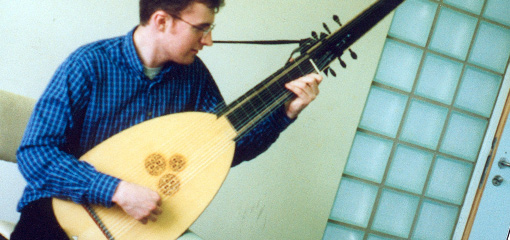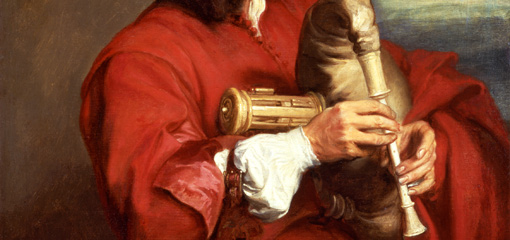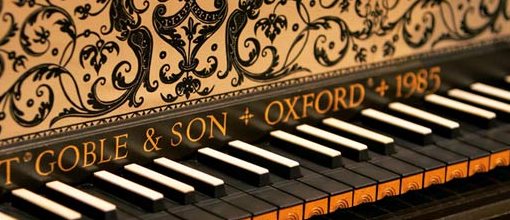Andrew Kirkman Director of CEMPR, Baroque-Classical Orchestra
In addition to his work as a scholar chiefly of Renaissance music, Andrew Kirkman has conducted and recorded orchestral and operatic repertory from the fourteenth century to the twentieth. He is director of the award-winning 'Binchois Consort’, which has made fourteen recordings, all on the Hyperion label. Its recordings and performances, of music by Du Fay, Binchois, Josquin, Busnoys and others, have received universally strong critical acclaim and many music industry prizes, including Gramophone ‘Early Music Recording of the Year’, Gramophone ‘Disc of the Month’ and a Diapason d’or. He has also had a busy career as a freelance violinist, and, with pianist Clipper Erickson, released a world premiere recording of violin sonatas by Cyril Scott.
Amy Brosius Joint Director, Early Modern Vocal Ensemble, Renaissance Vocal Ensembles
Amy is an academic and singer. She specialises in seventeenth-century Italian music, singing culture, vocal music and early modern gender construction. Her approach to research is interdisciplinary, employing methodologies from art history, critical theory, gender studies, and performance studies.
Mark Chambers Joint Director, Early Modern Vocal Ensemble
Mark works regularly with many of the world’s leading choirs and ensembles including Tenebrae, Gallicantus, The Monteverdi Choir, The Gabrieli Consort, the National Chamber Choir of Ireland and the Gramophone award-winning Binchois Consort. He is also director of the baroque ensemble Sestina. Mark has made many recordings, including a solo recital of songs by Edmund Rubbra and Vaughan Williams with David Mason (piano), and a series of discs with The English Cornett and Sackbut Ensemble with music from Italy Accendo) Germany (A Hanseatic Festival) and England (Flower of Cities).
Yeo-Yat Soon harpsichord
Yat-Soon was born in London of Chinese parents. He studied Music and Historical Musicology at King’s College London, and Harpsichord and Conducting the Guildhall School of Music, where he won the prestigious Raymond Russell Prize for Harpsichord. He performs widely as a harpsichordist, specializing in performing in historic buildings. Regular venues include the Chapel Royal at Hampton Court Palace, Handel House Museum, Strawberry Hill House in the UK, and Kammersaal Friedenau and the Music Instrument Museum, Berlin in Germany. Yat-Soon also specializes in baroque opera and has conducted for London Baroque Opera, City of London Festival and Opéra de Baugé. He plays with the ensembles Follia, The Stanesby Players and Camerata Berlinensis (Berlin). He performs regularly at the South Bank and St John’s Smith Square and has broadcast for BBC Radio 3 and Classic FM radio and BBC1, BBC4 and Channel 4 television. Yat-Soon has had a long association with education, having been Director of Music at St Paul’s Girls’ School and The Lady Eleanor Holles School. He currently teaches harpsichord, coaches chamber music and lectures on historical performance for the Centre for Early Music Performance and Research at the University of Birmingham. For further information please visit www.yeoyat-soon.org.
Lisete da Silva Bull baroque flute
Portuguese-born Lisete da Silva Bull studied baroque flute and recorder at the Royal Academy of Music and now performs, records and broadcasts with many of
the leading period-instrument groups and orchestras in the U.K., including the Orchestra of the Age of Enlightenment, Solomon’s Knot, Ex-Cathedra the Handel Orchestra and the acclaimed Brook Street Band, of which she is a core member. She is also highly sought after as a teacher and lecturer presenting lectures and masterclasses in Brazil, Slovenia, Portugal, Hull and Birmingham Universities, and the Royal Birmingham Conservatoire. She has recently been appointed professor of recorder and baroque flute at the newly established London Performing Academy of Music and is now baroque flute teacher at the University of Birmingham.
Lisete has recorded for Naxos, Quartz, Somme, Avie and First Hand records. Her long standing love of French Baroque and Rameau has taken her to PhD research with Graham Sadler and Shirley Thompson and she has published articles in various publications in Holland and the U.K.Website: lisetedasilvabull.com
David Hatcher viols
David Hatcher has broadcast for both the BBC and independent radio and television, and with such luminaries of early music as Evelyn Tubb, The Consort of Musicke, I Fagiolini, Sprezzatura, and the Japanese ensembles Chelys, Ensemble Ecclesia and the Bach Collegium of Japan.
He has appeared with Fretwork, The Royal Shakespeare Theatre, The Globe Theatre, The Consort of Musicke, Musica Antiqua of London, The Corelli Orchestra, The Harp Consort, Glyndebourne Opera and many other period orchestras and ensembles.
He regularly teaches on summer schools such as the Cambridge Early Music Summer School, the Easter Early Music Course at Monmouth and Sastamala Gregoriana in Finland, and is in demand as a tutor for many weekend and day courses.
Recent projects include performing in Damon Albarn’s opera ‘Dr Dee’ and performing and recording with I Fagiolini in their hugely successful interpretation of Striggio’s 40-voice mass. He performed in the inaugural season of the Sam Wanamaker Playhouse in 2014 and in the highly acclaimed production of The Knight of the Burning Pestle in 2014 & 2015. He is a founder member of The Linarol Consort of Viols, Philomel and The Intrepid Academy, which, under the direction of Philip Thorby, explores the rich heritage of early 16th century Venetian music.
Lynda Sayce lute, theorbo and Continuo Club
One of Britain’s leading lutenists with over 100 recordings to her name, Lynda Sayce performs regularly as soloist and continuo player with leading period instrument ensembles worldwide, is principal lutenist with The King’s Consort, Ex Cathedra and the Musicians of the Globe. She is also director of the lute ensemble Chordophony, whose repertory and instrumentarium is based exclusively on her research. Her repertory spans many centuries, and her discography ranges from some of the earliest surviving lute works to the jazz theorbo part in Harvey Brough’s ‘Requiem in Blue’. An experienced teacher at all levels, Lynda writes beginners’ lute lessons for the British lute society, has taught on many summer schools and courses, and is regularly invited to serve as specialist examiner by both universities and music conservatoires. She is currently preparing a didactic recording and companion edition of lute duets, commissioned by the lute society. Lynda has written for Early Music, the New Grove Dictionary of Music, and the art journal Apollo. She holds a PhD (Open University, 2001) for her research on the history of the theorbo, and contributed texts on the plucked instruments to the new musical instrument catalogue of the Ashmolean Museum, Oxford.
Anneke Scott natural horn
Anneke is principal horn in the following ensembles: the Orchestre Révolutionnaire et Romantique; The English Baroque Soloists; Harry Christophers’ The Orchestra of the Sixteen; and Fabio Biondi’s
Europa Galante. She has also frequently guested as principal horn with The English Concert, Freiburg Baroque Orchestra, and the Mahler Chamber Orchestra. She is a founder member of The Etesian Ensemble and of ensemble F2 with whom she performed the Mozart Horn Quintet at London’s Wigmore Hall in 2009. Anneke has recorded with all the major labels. She has undertaken research at CEMPR, and in 2010 was awarded a Gerald Finzi Travel Scholarship to pursue research in Paris in preparation for her recording of Jacques-Francois Gallay’s Douze Grands Caprices on natural horn. Anneke’s activities are not confined to period performance: she can be heard on albums with The Nigel Waddington Big Band; she has performed the music of Ligeti with The London Sinfonietta; and she has recorded John Croft’s new work …une autre voix qui change… for solo hand-horn.
Miki Takahashi baroque violin
Miki Takahashi is a period violinist, performing as a soloist and a chamber musician world-wide. She has appeared as a soloist at the Telemann Festival, Leipzig Bach Festival, Printemps des Arts 23ième Festival Baroque (Nantes), as well as giving her debut solo recital at Tokyo’s Hakuju hall in Japan and at The Schubert Club in Minnesota, USA. Her repertoire stretches from early baroque music such as Marini, Pandolfi and the forgotten repertoire of funerary violinists, to contemporary music. Miki was accepted onto the Academia Montis Regalis Baroque Orchestra Academy in 2005 as leader and as principal second violin, where she performed Vivaldi’s concerto for two violins with Enrico Onofri. She has made solo appearances with various ensembles including Les Nations Japan, Musica Fiorita (Basel), Feinstein Ensemble, Leipziger Barockorchester, Il Gardelino (Belgium), Ensemble Sans Souci Berlin, and Collegium Musicum 90. She is currently principal second violin with the Feinstein Ensemble, and has worked as co-leader with the St. James’s Baroque Players and the Gabrieli Consort.
Martyn Sanderson sackbut
Martyn is a Birmingham based trombone player specialising in historical performance and working with many of the country’s leading early music ensembles. Highlights include US tours with The English Baroque Soloists playing in venues such as Carnegie Hall and a European tour with the Orchestra of the Age of Enlightenment performing Bruckner’s 6th Symphony with Sir Simon Rattle.
As well as modern trombone tuition at UoB Martyn teaches individual sackbut lessons and runs the sackbut ensemble. Sessions explore instrumental and vocal music of the 16th and 17th centuries focusing on historical practices relating to articulation, ornamentation and interpretation of text.
Richard Thomas cornetto and natural trumpet
Richard has played with the major UK period instrument ensembles and regularly tours to Europe and beyond. Highlights have included touring the three Monteverdi operas with Sir John Elliot Gardiner and Beethoven Ninth Symphony with the Australian Chamber Orchestra.
Richard teaches natural trumpet and cornetto at the Royal College of Music and Royal Birmingham Conservatoire, as well as at UoB. Repertoire covered includes 17th century solos through to orchestral works of Bach and Handel. This repertoire can be studied using period or modern instruments, as requested, and mixed instrumentation chamber coaching in period performance is also available.
Emily Baines recorders and Renaissance winds
Emily is a versatile multi-instrumentalist who performs regularly for many period instrument ensembles, contemporary groups, music festivals and theatres across Europe. She is a member and co-founder of Blondel (medieval and renaissance wind band), selected in 2016 as one of BBC Radio 3’s ‘Introducing’ acts and who have recently released their acclaimed third album ‘Of Arms and a Woman’ with First Hand Records. Her playing is regularly featured on Radio, TV and Film.
Theatre work has included musician and musical director roles for Jericho House, English Touring Theatre, Barbican BITE, the RSC, National Theatre and Shakespeare’s Globe, including the Globe’s premier Broadway transfers of Twelfth Night and Richard III in 2013 starring Mark Rylance and Stephen Fry. In addition to her performing schedule, Emily is a lecturer in Music at Brunel University London, Guildhall School of Music & Drama and Shakespeare’s Globe Higher Education department, and is regularly invited to other H.E. institutions for guest lectures and practical workshops.
Other distinguished professionals who have recently worked with CEMPR include Jane Rogers, Garry Clarke, Hetti Price, Nick Stringfellow, Imogen Seth-Smith, Paula Chateauneuf, Sue Addison, Richard Tunnicliffe, Anthony Robson and Catherine Latham.



